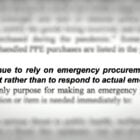2022 Special Edition
ICYMI: Amid record revenue, lawmakers fail to address risk of waste and fraud
|
Legislative Finance Committee analysts described over reliance on emergency procurement as resulting from mismanagement in their October report. Legislative analysts have repeatedly warned since 2016 that government agencies’ increasing reliance on no-bid contracting puts New Mexico at increased risk of waste and fraud. Their most recent admonition came a month after a state grand jury indicted a former powerful lawmaker for racketeering, money laundering and kickbacks related to a no-bid contract.
Lawmakers have largely ignored those warnings; in fact, a bill pre-filed for the legislative session starting Tuesday in Santa Fe appears to create new exemptions to the procurement code. Nor is reform a high priority for Democratic Gov. Michelle Lujan Grisham, whose three years in office have been marked by a sharp rise in no-bid contracting.
“Such an item is not currently an element of the agenda,” said Nora Meyers Sackett, a spokeswoman for Lujan Grisham, who has the power to set this year’s 30-day legislative agenda, as lawmakers are otherwise limited to budget matters. “But the governor’s office will, as always, review and evaluate potential initiatives.”
Since 2019, Lujan Grisham’s first year in office, her administration has circumvented competitive bidding on at least 886 occasions, approving sole-source and emergency contracts worth more than $796 million, greatly outpacing her Republican predecessor, according to New Mexico In Depth’s analysis of reports from state agencies under Lujan Grisham’s control.






